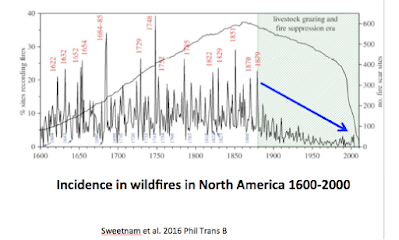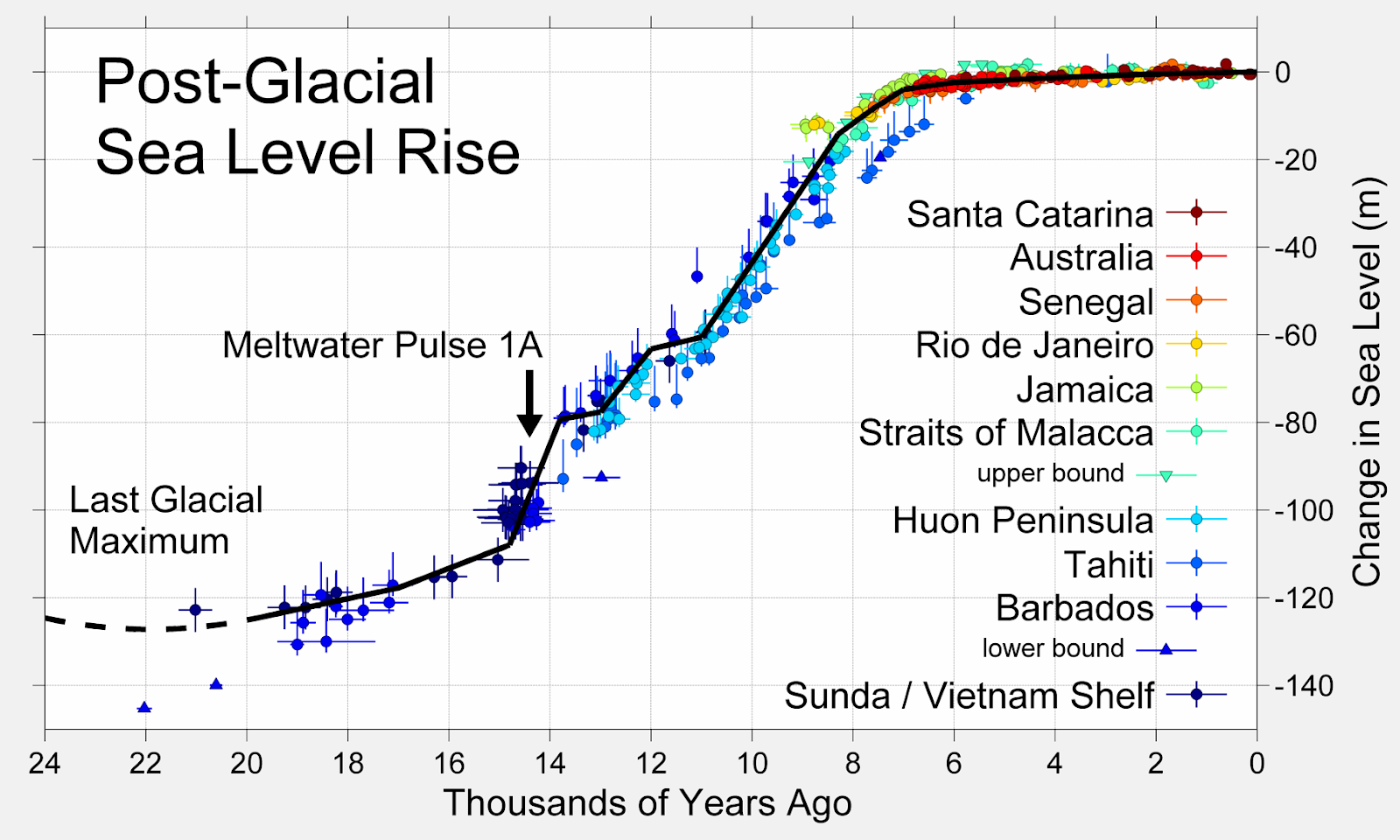Following is my response to the first comment on a letter to the editor about climate change and BC forest fires.
-------------------------------------------------------------------------------
To attempt the linkage of the current political situation in Syria with the tiny fraction of atmospheric carbon dioxide caused by man's productive activities requires a great leaps in credulity, one which no rational and knowledgeable person could make.
Droughts have been a fact of life since before humanity existed. Today, the only places where drought is insoluble are places where capitalism has not been implemented enough to allow the creation of the wealth needed to overcome drought.
When I say wealth, I mean particularly agricultural technology and the financial resources to implement it. Money is simply the currency of wealth exchange and money has no value if the products created by men are not brought into existence. Syria is poor because it is a society based on mysticism, altruism and collectivism and has only bare elements of capitalism, by which I mean freedom and the protection of individual rights by an objective government limited to this function by a constitution.
As I side note, it is interesting that the first commenter began by attacking the background and supposed affiliations of the article's author instead of beginning with a critique of his ideas. If you go into the ACTUAL SCIENCE sections of the IPCC report, not the Summary For Policymakers that is not written by scientists, you usually find the summary of scientific knowledge is very different, even the opposite of the Summary for Policymakers document, which the first commenter references and which is as far as many peple get if their reading, if they read the science at all. I will copy an exerpt from the science report about extreme events below. Note that this is from the IPCC itself, never mind the large number and variety of scientists who disagree with some of the conclusions the IPPC handpicked authors have reached. At the very least the science report is generally written in the language of science, lacking the hyperbole, speculation and unsupported statements found in the Summary For Policymakers.
Since the commenter specifically quoted the Synthesis report on the Summary For Policymakers I have chosen to contrast it with its supposed source. This is from the fifth assessment report "The Physical Science Basis", page 50 and can be found at the following link.
http://www.ipcc.ch/pdf/assessment-report/ar5/wg1/WG1AR5_TS_FINAL.pdf
++++++++++++++++++++++++++++++++++++++++++++++++
There is low confidence in a global-scale observed trend in drought or dryness (lack of rainfall), owing to lack of direct observations, dependencies of inferred trends on the index choice and geographical inconsistencies in the trends. However, this masks important regional changes and, for example, the frequency and intensity of drought have likely increased in the Mediterranean and West Africa and likely decreased in central North America and northwest Australia since 1950. {2.6.2;
Table 2.13}
There is high confidence for droughts during the last millennium of greater magnitude and longer duration than those observed since the beginning of the 20th century in many regions. There is medium confidence that more megadroughts occurred in monsoon Asia and wetter conditions prevailed in arid Central Asia and the South American monsoon region during the Little Ice Age (1450–1850) compared to the Medieval Climate Anomaly (950–1250). {5.5.4, 5.5.5}
Confidence remains low for long-term (centennial) changes in tropical cyclone activity, after accounting for past changes in observing capabilities. However, for the years since the 1970s, it is virtually certain that the frequency and intensity of storms in the North Atlantic have increased although the reasons for this increase are debated (see TFE.9). There is low confidence of large-scale trends in storminess over the last century and there is still insufficient evidence to determine
whether robust trends exist in small-scale severe weather events such as hail or thunderstorms. {2.6.2–2.6.4}
With high confidence, floods larger than recorded since the 20th century occurred during the past five centuries in northern and central Europe, the western Mediterranean region and eastern Asia. There is medium confidence that in the Near East, India and central North America, modern large floods are comparable or surpass historical floods in magnitude and/or frequency. {5.5.5}
++++++++++++++++++++++++++++++++++++++++++++++++
My summary:
1. There is low confidence there is any trend in rainfall change.
2. There is high confidence that droughts were more severe before the 20th century.
3. There is low confidence of any trend in tropical cyclone activity and insufficient evidence for trends in small scale weather events.
4. There is high confidence that floods larger than those of the past century occurred in the last five hundered years.
Much more about the low confidence in the existence of dangerous human caused global warming is found at the end of the IPCC Fifth Assessment Report and I copy one portio of this below, from page 115.
++++++++++++++++++++++++++++++++++++++++
TS.6.4 Key Uncertainties in Projections of Global and Regional Climate Change
• Based on model results there is limited confidence in the predictability of yearly to decadal averages of temperature both for the global average and for some geographical regions. Multi-model results for precipitation indicate a generally low predictability. Short-term climate projection is also limited by the uncertainty in
projections of natural forcing. {11.1, 11.2, 11.3.1, 11.3.6; Box 11.1}
• There is low confidence in near-term projections of a northward shift of NH storm track and westerlies. {11.3.2}
• There is generally low confidence in basin-scale projections of significant trends in tropical cyclone frequency and intensity in the 21st century. {11.3.2, 14.6.1}
• Projected changes in soil moisture and surface run off are not
robust in many regions. {11.3.2, 12.4.5}
• Several components or phenomena in the climate system could
potentially exhibit abrupt or nonlinear changes, but for many phenomena there is low confidence and little consensus on the likelihood of such events over the 21st century. {12.5.5}
• There is low confidence on magnitude of carbon losses through
CO2 or CH4 emissions to the atmosphere from thawing permafrost. There is low confidence in projected future CH4 emissions from natural sources due to changes in wetlands and gas hydrate release from the sea floor. {6.4.3, 6.4.7}
• There is medium confidence in the projected contributions to sea level rise by models of ice sheet dynamics for the 21st century, and low confidence in their projections beyond 2100. {13.3.3}
• There is low confidence in semi-empirical model projections of
global mean sea level rise, and no consensus in the scientific community about their reliability. {13.5.2, 13.5.3}
• There is low confidence in projections of many aspects of climate phenomena that influence regional climate change, including changes in amplitude and spatial pattern of modes of climate variability. {9.5.3, 14.2–14.7}
+++++++++++++++++++++++++++++++++++++++++++
Are you seeing the pattern? The science that the alarmists refers to is to be found in the IPCC Technical Summary, a document that clearly contradicts about every wild claim made by the alarmists, even their leaders who should and would know better if only they read the actual Technical Summary. There is such a volume of evidence of flagrant disregard for the scientific method by the alarmists that we can dismiss all their past, present and future claims out of hand and without further consideration.





